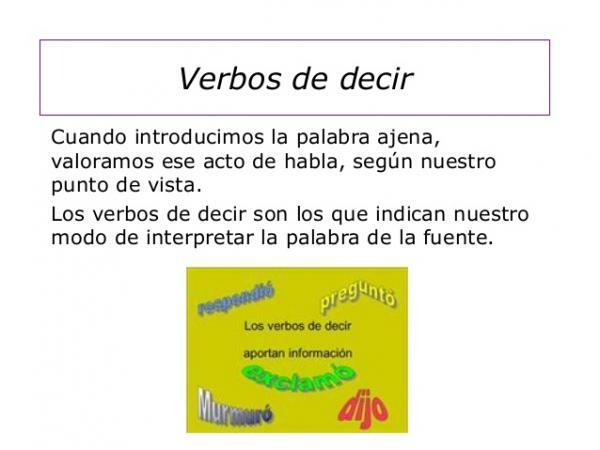What are the speaking verbs

Image: Slideshare
The enormous wealth of the Spanish language allows us to distinguish between a good number of possibilities. Therefore, in this lesson from a TEACHER, we are going to focus on knowing what are the speaking verbs. However, it may be that you find them under one of their multiple nomenclatures, since they are known in other ways. And it is that these verbs are also called ‘dicendi’ verbs, communication verbs or declarative verbs.
If you look closely, it is possible that you can already get an idea of the reason for the name of these particular verbs, as well as their use and utility. Be that as it may, take a paper and pencil, because we are going to explain what they are, what they are used for and what they are, well you can find a huge list of them at the end of this lesson so you can meet them.
Index
- What are speaking verbs
- Meaning of speaking verbs
- Speaking verbs
What are speaking verbs.
Before knowing what speaking verbs are, it is important to find out what they are. As we have commented, they are also called declarative, communication or ‘dicendi’ verbs, because
express beliefs or designate communicative actions.They are also used as a reflection or emotion, while serving to introduce parliaments into indirect and direct style.
- A direct-style parliament could be: You are going to love it - said Pablo.
- A parliament in indirect style is identified by this formula: Paco interrupted him and told him to shut up.
Meaning of speaking verbs.
Like is logic, the meaning of speaking verbs is 'to say', which could be considered as the generic verb. However, depending on the specific context, others that are closer to the particular meaning may be used:
- I arrive at ten - said Juan.
- I arrive at ten o'clock - pointed out Juan.
We can observe that they carry implicit actions that are manifested verbally, so the concept of say it is always implicit. In addition, they denote a behavior of the speaker, hence they are used according to the particular context.

Image: Slideshare
Speaking verbs.
Now, if you want to know exactly what speaking verbs are, here is a list of almost 400 synonyms of the verb 'say' which can be used depending on the dialogue, the parliament, the environment or the situation:
- Approach
- Overwhelm
- Accentuate
- Get to say
- Clear out
- Advise
- Agree
- Accredit
- to accuse
- To admire
- To admit
- Flatter
- Warn
- Say
- Add
- Boast
- Plead
- Gladden
- Encourage
- Alert
- Allude
- Threaten
- Entertain
- Admonish
- Analyze
- Encourage
- Annotate
- Announce
- Add
- To bet
- To support
- Point
- Point
- Argue
- To argue
- Lash out
- Risk
- To assure
- Assent
- Assert
- Frighten
- Attack
- Witness
- Attribute
- Augur
- Venture
- Warn
- Babble
- Stammer
- Sense
- Bawl
- Roar
- To joke
- Outwit
- Calculate
- Censor
- Scream
- Gossip
- Quote
- Clamor
- Sort out
- Coincide
- Comment
- Compare
- Check
- Compromise
- Communicate
- Arrange
- Conclude
- Specify
- Condemn
- To confess
- Trust
- Confirm
- Confuse
- Congratulate
- Guess
- Conjure
- To consider
- Comfort
- Note
- To record
- Tell
- Temporize
- To answer
- Continue
- Counter
- Contradict
- Agree
- Correct
- Corroborate
- Cut off
- Court
- Gossip
- Criticize
- Whisper
- Question
- Realize
- To debate
- Disappoint
- Say
- To declare
- Decree
- Defend
- Define
- Spell out
- To sue
- Show
- Report
- To challenge
- Disarm
- Discard
- Mistrust
- Describe
- To find out
- Disdain
- Despair
- Vent
- Cheat
- Desist
- Deny
- Highlight
- Reveal
- Detail
- Decide
- Return
- To diagnose
- Disagree
- Excuse
- Reason
- Argue
- Dissent
- Shoot
- Distinguish
- Amuse
- Exemplify
- To praise
- Thrill
- Anger
- Emphasize
- Infuriate
- Cheat
- Cajole
- Prosecute
- Amend
- Anger
- To be proud
- Understand
- Tone
- Enthuse
- Enumerate
- Scandalize
- Clarify
- Spit
- Scare away
- Specify
- Spit
- Dodge
- Set up
- Burst
- Estimate
- Stipulate
- Show
- Exaggerate
- Exclaim
- Exhort
- Demand
- Explode
- Explain
- Make explicit
- Exploit
- Expose
- Express
- Externalize
- Exult
- Babble
- Celebrate
- Philosophize
- Finalize
- Pretend
- Formulate
- Fulminate
- To guarantee
- Moan
- Shout out
- Snarl
- Speak
- Point out
- Flatter
- Hyperbolize
- Chronicle
- Identify
- To illustrate
- To imagine
- Implore
- Importune
- Improvise
- Encourage
- Incite
- Rebuke
- Inquire
- Indicate
- To outrage
- Report
- Insinuate
- Insist
- To insult
- Interpret
- Question
- Interrupt
- To intervene
- To sense
- Invent
- Ironize
- Irritate
- Swear
- Justify
- To regret
- Throw
- Limit
- Flatter
- To call
- To crush
- Manifest
- Wonder
- Mumble
- Nuance
- To meditate
- To mention
- Mentalize
- To lie
- Minimize
- Mock
- Show
- Murmur
- Musing
- Narrate
- Deny
- To name
- Notice
- Notify
- Object
- Watch
- Opine
- To oppose
- Order
- Paraphrase
- Ask
- Think
- Perch
- Compliment
- To plan
- Talk
- Weigh
- Specify
- Advocate
- Predict
- Trumpet
- To ask
- Worry
- To prevent
- Foresee
- Proclaim
- Prophesy
- Promise
- Predict
- To pronounce
- Propose
- Advocate
- Pursue
- To protest
- To provoke
- Punctuate
- Complain
- Ratify
- To reason
- Reaffirm
- Refute
- Bounce
- Emphasize
- Prescribe
- Claim
- Recommend
- Recompose
- To recognize
- Remember
- Reflect
- Beef up
- Grumble
- Tell off
- to register
- Rejoice
- To reiterate
- Relate
- Tell
- Relativize
- Recall
- Quarrel
- Repeat
- Replicate
- Reprimand
- Fail
- Reproach
- Highlight
- Resign
- To resist
- Wheeze
- Sort out
- Blow
- Answer
- Hold accountable
- Summarize
- Challenge
- return
- To reveal
- Grumble
- Pray
- Roar
- Follow
- Sentence
- Point
- Lecture
- Simplify
- Synthesize
- Hiss
- Apply for
- Sob
- Release
- Hold
- Underline
- Suggest
- Supplicate
- Suppose
- To sigh
- Sustain
- To whisper
- Stutter
- Stutter
- Fear
- Theorize
- Tertiary
- End up
- Testify
- Hesitate
- To transmit
- Weave
- Hesitate
- Boast
- Foretell
- Shout
If you want to read more articles similar to What are the speaking verbs, we recommend that you enter our category of Grammar and Linguistics.



